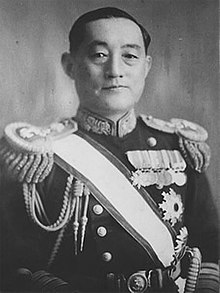Mitsumasa Yonai
Prime Minister of Japan (1880-1948)
Mitsumasa Yonai (March 2, 1880 – April 20, 1948) was an admiral in the Imperial Japanese Navy, and politician. He was the 37th Prime Minister of Japan. Yonai played a major role during the Tokyo war crimes trials in working with the major defendants, such as Hideki Tojo, to coordinate their testimonies so that Emperor Hirohito would be spared from indictment. He later died of pneumonia in 1948 at the age of 68.

Quotes
- Our defeat at Leyte was tantamount to the loss of the Philippines. When you [the Allies] took the Philippines, that was the end of our resources.
- Quoted in Stanley Lawrence Falk, Decision at Leyte (1966), p. 319.
- There is no chance whatsoever of victory; therefore I agree with the foreign minister that the Potsdam declaration should be accepted at once, with only that one condition about retaining the Emperor.
- Quoted in Lester Brooks, Behind Japan's Surrender: The Secret Struggle that Ended an Empire (1968), p. 66.
- History shows that whenever an emergency arises, our national spirit is most emphatically manifested to advance the prestige and fortune of the nation. It is incumbent upon us to leave no stone unturned in order to promote loyalty and bravery on the home front as well, and to replenish and demonstrate our nation's powers, for which are required the inculcation of the spirit of reverence for deities and respect for ancestors, the renovation of national education and the of the people's physical strength.
- alternate version: History shows that, whenever an emergency arises, our national spirit is manifested most emphatically to advance the prestige and bring about the prosperity of the nation. Nor must we be negligent in any way in promoting a loyal and heroic spirit among the home-front population so that national strength may be augmented and given full play. For this purpose, such measures as the fostering of the spirit of piety and of honouring ancestors, the renovation of national education and the improvement of the people's physical strength.
- Quoted in Nihon Gaiji Kyokai, Tokyo Gazette, p. 343. Also quoted in Daniel Clarence Holtom, Modern Japan and Shinto Nationalism (1963), p. 19.
- We might win the first battle for Japan, but we won't win the second. The war is lost to us. Therefore we must forget about 'face,' we must surrender as quickly as we can, and we must begin to consider at once how best to preserve our country.
- Quoted in Henry Hitch Adams, Years to victory (1973), p. 448.
- It may be inappropriate to put it in this way, but the atomic bombs and the Soviet entry into the war are, in a sense, God's gifts. Now we can end the war without making it clear that we have to end the war because of the domestic situation. I have long been advocating the conclusion [of the war], not because I am afraid of the enemy's attacks or because of the atomic bombs or the Soviet participation in the war; The most important reason is my concern over the domestic situation.
- Quoted in "A-bombs were 'God's gifts' to Japanese regime", Taipei Times (August 7, 2005).
- Japan is fully prepared to take appropriate steps in event that the United States continues its oppression.
- Quoted in "Japanese Hurl Veiled Threat", Los Angeles Times (February 11, 1940).